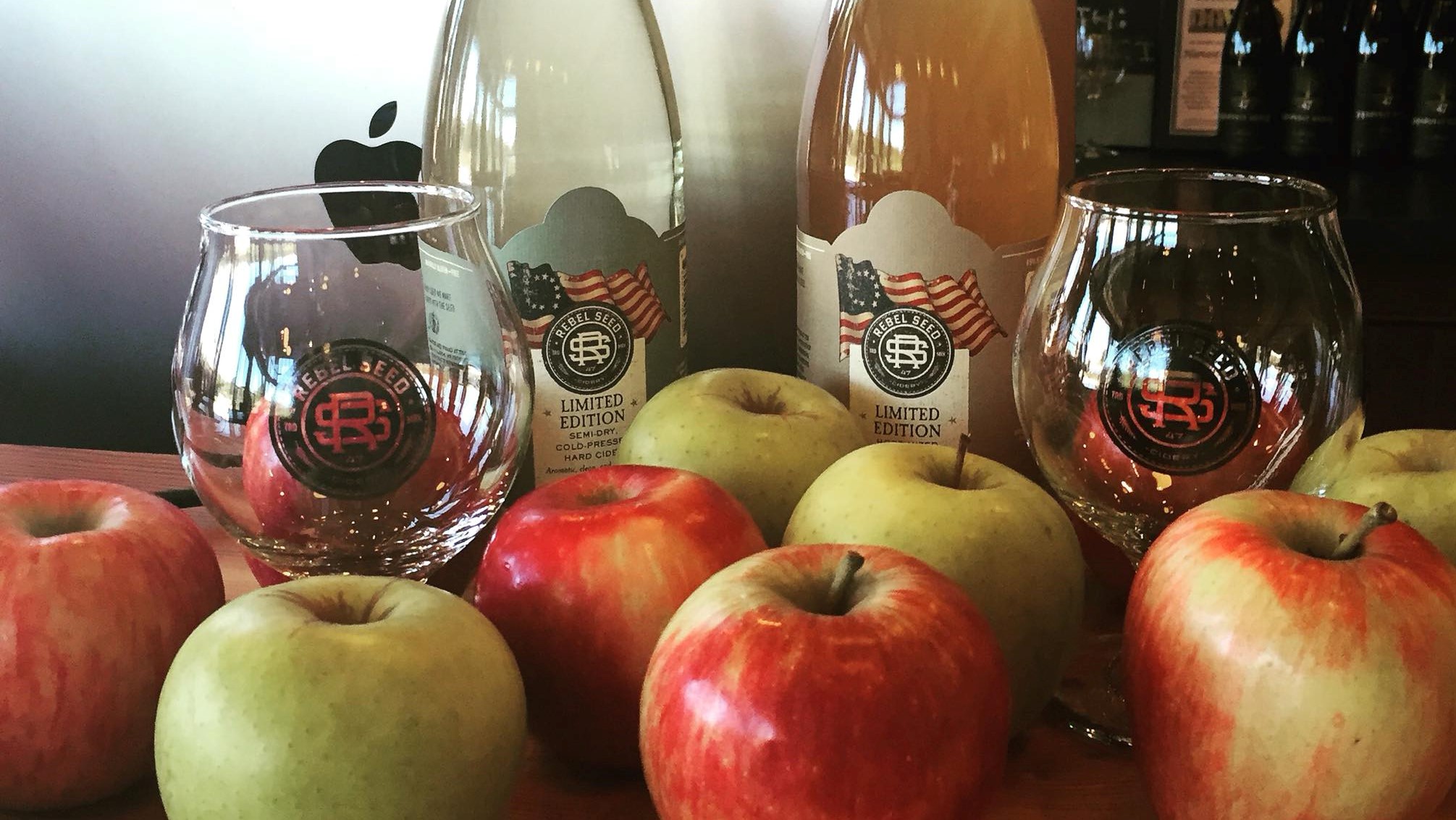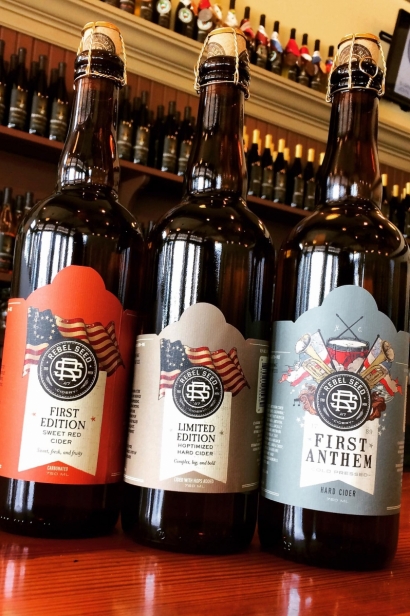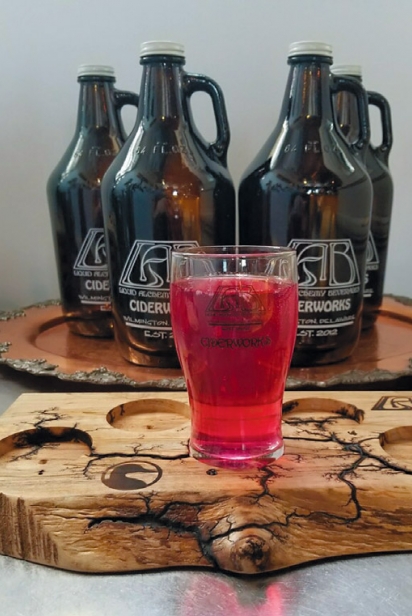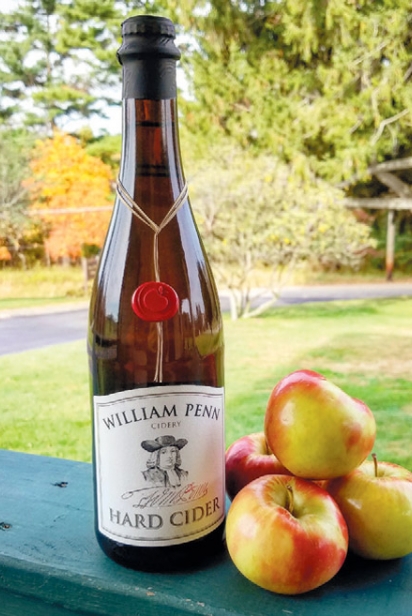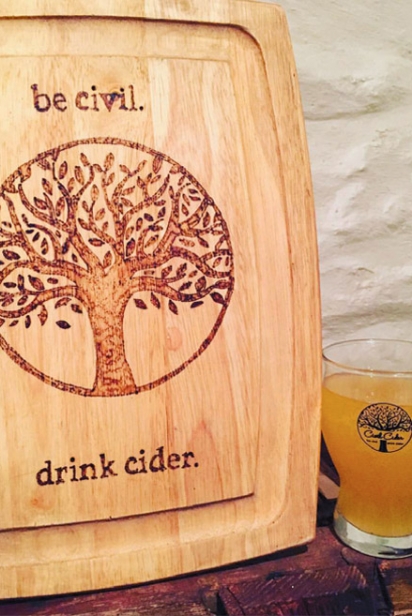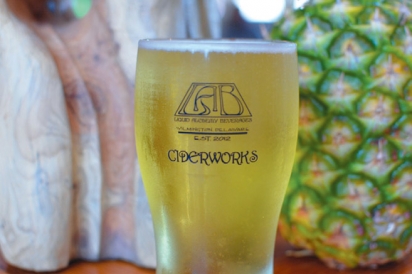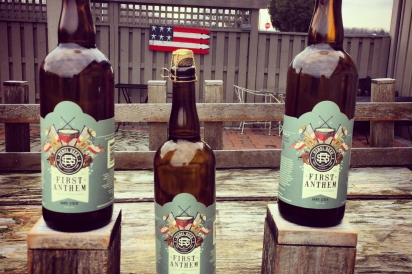Going Hard on Cider
In Wilmington, cider is having its craft beer moment.
Across the country, and especially in the Northeast, the bubbly drink that formerly occupied space near the bottom of the beverage totem pole is surging. And just like the craft beer boom of the early 2000s, the hard cider renaissance is being driven by small, experimental outfits bent on infusing creativity and flair into and onto their bottles.
“As long as you have quality, local products, people will spend the money and enjoy them,” says Jason Hopwood, cider-maker for Rebel Seed Cider—an offshoot of Harvest Ridge Winery near Marydel, Del. “People are giving the smaller guys a look because they’re the ones that are gonna push quality and ingenuity, whether it’s ingredients or techniques or even the branding.”
Craft cideries like Rebel Seed are beginning to punch away at mass-produced competition from global giants like MillerCoors (Redd’s Apple Ale) and industry mainstays Samuel Adams (Angry Orchard) by following the playbook left by craft beer pioneers like Dogfish Head—primo ingredients, local inspiration, and wild experimentation.
Since launching in 2015, Rebel Seed has built around its flagship First Anthem cider—a finely balanced introductory cider made from Stayman apples that imparts a hit of tannins and acidity—and expanded the roster with varieties like Hoptimize, a bone-dry offering that’s infused with brewing hops.
It’s a deliberate play, Hopwood says, going after the craft beer acolytes. And just as Rebel Seed worked to differentiate its brand from its winery roots, others in the cider world are turning to the bold flavors, wacky names, and hip artwork typically associates with craft beer. “The cider world is a little more edgy,” he says. “It doesn’t have that ‘snobby’ baggage that the wine world might carry.”
The strategy is working. While cider takes up a relatively miniscule corner of the beer industry (about one percent, according to RBC Capital Markets), it grew in sales by 92 percent in 2012, 77 percent in 2013 and 87 in 2014. And while overall cider sales have dipped slightly during that time, local, regional, and smaller cider brands are, by and large, surging—with a 39 percent increase in retail sales from 2015 to 2016, according to the United States Association of Cider Makers.
Some also correlate hard cider’s rise with the recent proliferation of gluten-free diets. Unlike beer, cider does not contain barley or wheat.
Jeffrey Cheskin and Terri Sorantino are feeling the surge. The former home-brew hobbyists opened Liquid Alchemy Beverages in Wilmington in 2016, hanging their hats on another esoteric drink: mead. Two months into slinging the honey-based beverage, they began incorporating hard cider into the mix. “It’s been gangbusters over the last 10 months,” Cheskin says.
Like Rebel Seed, Liquid Alchemy started with the basics: Their Traditions cider is a straightforward affair, using a Colonial recipe of just fresh apples from Kauffman’s Fruit Farm in Bird in Hand, Pa., yeast, and water. “Plain and simple,” Cheskin says. “Clean, crisp, dry cider.”
That’s about where the austerity ends. Since launching Traditions, Liquid Alchemy menu today includes The Dark Cide(r), with its mahogany color and caramel nose from added ingredients like orange blossom honey and Belgian candy syrup. There’s Pineapple Experiment #13, which brings fresh and caramelized pineapples to the party. Deeply Rooted is a woodsy throwback that features sarsaparilla, birch bark, and Madagascar vanilla beans. While the recently unveiled Magenta Dragon uses pink dragonfruit, mangos, and fresh mint leaves to achieve flavors and colors the cider world has never seen. “We brought that out to our tasting room a few weeks ago in a 5-gallon experimental batch,” says Sorantino, “and it sold out in six hours.”
“People are getting saturated with craft beer and are looking for something different and unique,” she says. “Cider and mead, we think, are filling that space.”
Lynda Blades, whose family has owned Blades Orchard in Federalsburg, Md. since 2008, heard the urging of friends and peers to help fill that space. “We just had all the raw materials,” she says. And with that, they opened Faulkner Branch Cidery & Distilling in 2015, after she and her husband whittled 40 cider recipes down to four.
With a treasure trove of heirloom apples at their fingertips, the family hand-crafts ciders like the dry Headwater cider, and the slightly sweeter Tax Ditch and The Jungle blends—all using a mix of apples rarely spotted at the megamart, like Gold Rush, Summer Rambo, and Smokehouse. “I think more and more you’re seeing people going to farmers markets for the food or raising chickens in their backyards,” Blades says. “People are just interested in getting back to those historic roots.”
Penns Woods Winery, just over the Delaware border in Chadds Ford, Pa., added William Penn Cidery to its mostly white wine and rose program this year. The flagship cider, a dry offering made with gold rush apples carries intense herbal notes on top of a medium-bodied feel. “We wanted to explore making a cider that featured apples from our county,” say winemakers Gino Razzi and Davide Creato. “We have a strong sense of Pennsylvania pride and want to showcase not only the world class wines we have made but the potential of ciders as well.”
Legendary Delaware orchard T.S. Smith & Sons were credited with launching the state’s first hard cider—Black Twig—in 2012, after teaming up with Great Shoals Winery in Silver Springs, Md. The dry sparkling hard cider is made from a special heirloom Black Twig apple. Great Shoals also utilizes T.S. Smith “blazing star” peaches to make the limited Blazing Star Hard Peach cider.
Gretchen and Alex Sianni—who together own two De La Coeur Cafés around Wilmington—plan to open the downtown area’s first craft cidery sometime in 2018. Once open, Civil Cider will offer a hip tasting-room vibe (and a Honeycrisp flagship variety) for the city’s growing population of young professionals. The national hard cider trend is just beginning to infiltrate the Delmarva area, Alex says, but it’s appeal—especially to reformed craft beer drinkers—is undeniable. “With craft beer, once you get to a certain age, you can really start to feel it along the waistline; it can be bloating,” he says. “But cider is light, it’s refreshing, it’s gluten-free. We’re just excited to give craft cider another shot at the taps here in Wilmington.
- Civil Cider COMING SOON!
North Shipley and West Fifth Streets, Wilmington, DE
- Faulkner Branch Cidery & Distilling
4822 Preston Road, Federalsburg, MD; 410-829-0334
- Great Shoals Winery
14526 New Hampshire Avenue, Silver Spring, MD; 410-849-9616
- Liquid Alchemy Beverages
28 Brookside Drive, Wilmington, DE; 302-438-0252
- Penns Woods Winery
124 Beaver Valley Road, Chadds Ford, PA; 610-459-0808
- Rebel Seed Cider
447 Westville Road, Marydel, DE; 302-343-9437


